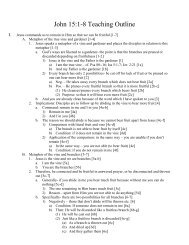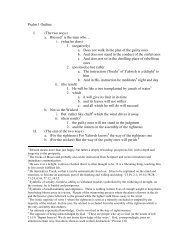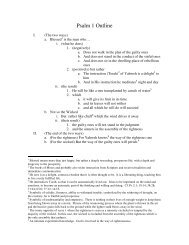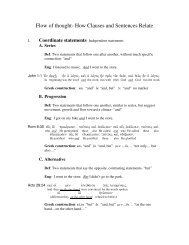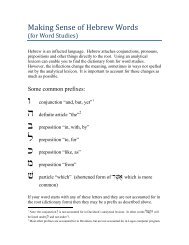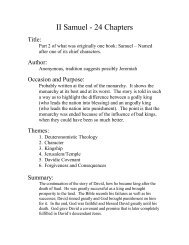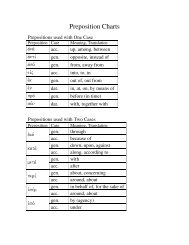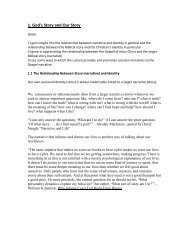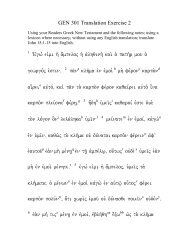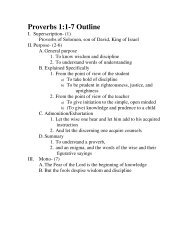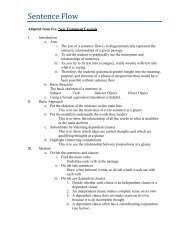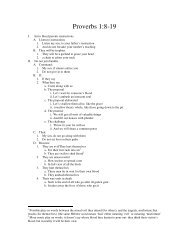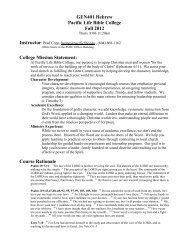Course Syllabus - Bradcopp.com
Course Syllabus - Bradcopp.com
Course Syllabus - Bradcopp.com
Create successful ePaper yourself
Turn your PDF publications into a flip-book with our unique Google optimized e-Paper software.
GR301 Beginning NT Greek I<br />
Eugene Bible College<br />
Fall 2008<br />
Mon., Tues., Wed., and Fri., 3:00-3:50pm<br />
Instructor: Brad Copp, bradcopp@ebc.edu , (541)510-4768<br />
Office hours in the Doris Hunt Music Building.<br />
College Mission Statement:<br />
The mission of Eugene Bible College is to glorify God through Biblically based college education<br />
that disciples and equips servants of Jesus Christ to be<strong>com</strong>e life-long learners who offer effective<br />
and relevant Spirit-filled ministry and leadership in the Church and the world.<br />
College Academic Out<strong>com</strong>es<br />
The College academic programs exist to encourage and facilitate students in the development of:<br />
• Leadership potential and effectiveness<br />
• Mental discipline and intellectual capacity that will shape and guide their life and work<br />
• Tools and attitudes conducive to Spirit-filled ministry<br />
• Effective <strong>com</strong>munication tools for life and ministry<br />
• Awareness of the world in which evangelism and ministry will occur<br />
• Clarity regarding the philosophical foundations of ministry<br />
Bible Theology Division Objectives<br />
Students fulfilling the course requirements in Bible and Theology should achieve the following:<br />
• Gain a basic understanding of the content and nature of the Old and New Testaments<br />
• Ability to apply Bible study skills to better understand and interpret the Bible<br />
• Ability to articulate a Biblical position in major areas of theology<br />
• Ability to reason clearly and Biblically about the Christian faith<br />
• Integrate Biblical study with personal spiritual growth and effective ministry<br />
<strong>Course</strong> Rationale<br />
Psalm 19:7-11<br />
7 The law of the LORD is perfect, reviving the soul. The statutes of the LORD are<br />
trustworthy, making wise the simple. 8 The precepts of the LORD are right, giving joy to the<br />
heart. The <strong>com</strong>mands of the LORD are radiant, giving light to the eyes. 9 The fear of the LORD is<br />
pure, enduring forever. The ordinances of the LORD are sure and altogether righteous. 10 They<br />
are more precious than gold, than much pure gold; they are sweeter than honey, than honey from<br />
the <strong>com</strong>b. 11 By them is your servant warned; in keeping them there is great reward.<br />
Psalm 119:43,47,48-48, 92, 95, 97-99, 103, 105, 160 43 Do not snatch the word of truth from my<br />
mouth, for I have put my hope in your laws… 47 for I delight in your <strong>com</strong>mands because I love<br />
them. 48 I lift up my hands to your <strong>com</strong>mands, which I love, and I meditate on your decrees… 92 If<br />
your law had not been my delight, I would have perished in my affliction... 95 The wicked are<br />
waiting to destroy me, but I will ponder your statutes… 97 Oh, how I love your law! I meditate on it<br />
all day long. 98 Your <strong>com</strong>mands make me wiser than my enemies, for they are ever with me. 99 I<br />
have more insight than all my teachers, for I meditate on your statutes… 103 How sweet are your<br />
words to my taste, sweeter than honey to my mouth!… 105 Your word is a lamp to my feet and a<br />
light for my path… 160 All your words are true; all your righteous laws are eternal.<br />
Ezra 7:10 10 For Ezra had devoted himself to the study and observance of the Law of the LORD,<br />
and to teaching its decrees and laws in Israel. See Neh. Ch. 8<br />
John 5:39<br />
39 You diligently study the Scriptures because you think that by them you possess<br />
eternal life. These are the Scriptures that testify about me,
1 Timothy 4:13-16 13 Until I <strong>com</strong>e, devote yourself to the public reading of Scripture, to<br />
preaching and to teaching. 14 Do not neglect your gift, which was given you through a prophetic<br />
message when the body of elders laid their hands on you. 15 Be diligent in these matters; give<br />
yourself wholly to them, so that everyone may see your progress. 16 Watch your life and doctrine<br />
closely. Persevere in them, because if you do, you will save both yourself and your hearers.<br />
2 Timothy 2:15 15 Do your best to present yourself to God as one approved, a workman who does<br />
not need to be ashamed and who correctly handles the word of truth.<br />
"Pastors who do not know Greek are forced to borrow their ideas from others. They are slaves to<br />
the <strong>com</strong>mentators, but have no means to check their accuracy. The best tools of interpretation are<br />
beyond their reach." -David Black<br />
"The more a theologian detaches himself from the basic Hebrew and Greek text of Holy Scripture,<br />
the more he detaches himself from the source of real theology And real theology is the<br />
foundation of a fruitful and blessed ministry." -Heinrich Bitzer,<br />
"If the languages had not made me positive as to the true meaning of the word, I might have still<br />
remained a chained monk, engaged in quietly preaching Romish errors in the obscurity of a<br />
cloister; the pope, the sophists, and their anti-Christian empire would have remained unshaken." -<br />
Martin Luther<br />
"Without languages we could not have received the Gospel. Languages are the scabbard that<br />
contains the sword of the Spirit; they are the casket which contains the priceless jewels of antique<br />
thought; they are the vessel that holds the wine; and as the gospel says, they are the baskets in<br />
which the loaves and fishes are kept to feed the multitude.<br />
If we neglect the literature we shall eventually lose the gospel….No sooner did men cease to<br />
cultivate the languages than Christendom declined, even until it fell under the undisputed<br />
dominion of the pope. But no sooner was this torch relighted, than this papal owl fled with a<br />
shriek into congenial gloom….In former times the fathers were frequently mistaken, because they<br />
were ignorant of the languages and in our days there are some who, like the Waldenses, do not<br />
think the languages of any use; but although their doctrine is good, they have often erred in the<br />
real meaning of the sacred text; they are without arms against error, and I fear much that their<br />
faith will not remain pure." – Martin Luther<br />
"As dear as the gospel is to us all, let us as hard contend with its language." Martin Luther<br />
"A guide to souls ought to know the literal meaning of every word, verse, and chapter in Scripture,<br />
without which there can be no firm foundation on which the spiritual meaning can be built...Can<br />
he do this in the most effectual manner, without a knowledge of the original languages Without<br />
this will he not frequently be at a stand, even as to texts which regard practice only But will he<br />
be still under greater difficulties with respect to converted Scriptures. He will not be able to<br />
rescue these out of the hands of any man of learning that would pervert them: for whenever an<br />
appeal is made to the original [language], his mouth is stopped at once." -John Wesley<br />
“Once John Wesley received a note from a self-appointed evangelist telling him, ‘The Lord has<br />
told me to tell you that He doesn't need your book learning, your Greek and Hebrew.’ Wesley<br />
replied, ‘Thank you, Sir. Your letter was superfluous, however, as I already knew the Lord has no<br />
need of my 'book learning' as you put it. However, although the Lord has not directed me to say<br />
so, on my own responsibility I would like to say, the Lord does not need your ignorance either.’" -<br />
source unknown<br />
“It should go without saying that if a professor in biblical studies is unable to deal with technical<br />
linguistic arguments in a class because most of the students have not taken Greek and Hebrew, the<br />
level of instruction necessarily drops. Moreover, the important education that takes place as<br />
students converse with one another also plummets several notches. The natural tendency to<br />
gravitate toward ‘relevancy’ and pragmatism can do nothing but flourish in such an environment.<br />
And the end result is an increase in the poisonous anti-intellectualism that has already taken its toll<br />
in the evangelical church.” - Moises Silva
<strong>Course</strong> Objectives:<br />
Upon <strong>com</strong>pleting this course, the student should be able to:<br />
1. Develop a working knowledge of Greek morphology, grammar, and basic syntax.<br />
2. Define over 100 Greek vocabulary words.<br />
3. Understand and recognize five Greek cases.<br />
4. Translate selected Greek sentences.<br />
5. Have gained an appreciation for how knowledge of the Greek language can be a valuable<br />
help to Bible study.<br />
6. Apply insights gained from study of the NT in Greek to life and ministry<br />
<strong>Course</strong> Description:<br />
An initial study of the rudiments of koine Greek including pronunciation, phonology, word<br />
formation, and grammar and syntax. Simple selected sentences in the Greek New Testament will<br />
be translated.<br />
Textbooks and Suggested Readings:<br />
Textbooks<br />
Goodrich, Richard J. and Albert Lukaszewski eds., A Reader’s Greek New Testament- 2 nd<br />
ed., Grand Rapids, Zondervan, 2007.<br />
Mounce, William D., Basics of Biblical Greek- Grammar 2 nd ed., Grand Rapids, Zondervan,<br />
2003.<br />
Mounce, William D., Basics of Biblical Greek- Workbood 2 nd ed., Grand Rapids, Zondervan,<br />
2003.<br />
Suggested Readings<br />
Black, David Alan, Linguistics for Students of New Testament Greek, Grand Rapids, Baker,<br />
1988.<br />
-----, Using New Testament Greek in Ministry, Grand Rapids, Baker, 1993.<br />
-----, It’s Still Greek to Me, Grand Rapids, Baker, 1998.<br />
Greenlee, Harold, A Concise Exegetical Grammar of New Testament Greek, Grand Rapids,<br />
Eerdmans, 1986.<br />
Lamerson, Samuel, English Grammar to ACE New Testament Greek, Grand Rapids,<br />
Zondervan. 2004.<br />
Metzger, Bruce, Lexical Aids for Students of New Testament Greek, Princeton, Theological<br />
Book Agency, 1989.<br />
Sizler, Peter James, and Thomas Findley, How Biblical Languages Work, Grand Rapids,<br />
Kregel, 2004.
<strong>Course</strong> Requirements:<br />
1. Class Participation- Student is to be present, and to participate in all classroom<br />
discussion and activities<br />
2. Textbook Reading- Student is to read the assigned sections of the course<br />
Textbook before the assigned class session.<br />
3. Workbook Exercises- Student is to <strong>com</strong>plete the assigned workbook exercises<br />
before the assigned class session.<br />
4. Vocabulary/Grammar Cards- Student is to hand make flash cards for all the<br />
vocabulary words and grammar paradigms. The purpose for this assignment is to<br />
take advantage of the learning/memorization benefit of connecting eye and brain<br />
with your hand. Therefore, using <strong>com</strong>mercially purchased or <strong>com</strong>puter generated<br />
flash cards will not fulfill this assignment.<br />
5. Vocabulary Quizzes- Student will take regular quizzes in which they will<br />
translate assigned Greek words into English.<br />
6. Grammar/Translation Quizzes- Student will take regular grammar/translation<br />
quizzes in which they will recognize, describe, parse/and or translate various<br />
aspects of New Testament Greek.<br />
7. Translation Exercises- Student will put their Greek knowledge into practice by<br />
translating short sections of Greek text into English.<br />
8. Sectional Exams- There will be three sectional exams which will cover all of the<br />
material up to that point in the term (material covered in the first exam will be fair<br />
game for the second and third). The exams will cover vocabulary,<br />
grammar/parsing, and translation.<br />
<strong>Course</strong> Evaluation<br />
Class Participation 5%<br />
Workbook Exercises 10%<br />
Vocabulary/Grammar Flashcards 10%<br />
Vocabulary Quizzes 10%<br />
Grammar/Translation Quizzes 10%<br />
Translation Exercises 10%<br />
Sectional Exams 15% ea 45%<br />
100%
<strong>Course</strong> Schedule<br />
Date Mon. Tues. Wed. Fri.<br />
Wk. 1<br />
Sept.<br />
22-26<br />
Wk. 2<br />
Sept.29<br />
-Oct. 3<br />
Wk. 3<br />
Oct.<br />
6-10<br />
Wk. 4<br />
Oct.<br />
13-17<br />
Wk. 5<br />
Oct.<br />
20-24<br />
Wk. 6<br />
Oct.<br />
27-31<br />
Wk. 7<br />
Nov.<br />
3-7<br />
Wk. 8<br />
Nov.<br />
10-14<br />
Wk. 9<br />
Nov.<br />
17-21<br />
Wk. 10<br />
Nov.<br />
24-28<br />
Wk. 11<br />
Dec.<br />
1-5<br />
Registration<br />
No Class<br />
Introduction,<br />
<strong>Syllabus</strong><br />
BBG chs. 1-3 WB. Ex. 3 BBG ch. 4 WB. Ex. 4,<br />
Review #1<br />
BBG chs. 5-6 Alphabet Quiz WB. Ex. 6 Vocab. Quiz 4<br />
BBG ch. 7<br />
Sectional Exam<br />
Case Endings<br />
Quiz<br />
Case Endings<br />
Quiz<br />
Community<br />
Service Day<br />
NO CLASS<br />
Preposition Quiz WB. Ex. 9<br />
Review #2<br />
Sectional Exam<br />
Final Exam, Tuesday Dec. 9, 3:00 pm<br />
WB. Ex. 7 Vocab. Quiz 6<br />
BBG ch. 8 Vocab. Quiz 7<br />
WB. Ex 8 Vocab. Quiz 8 BBG ch. 9<br />
Spiritual<br />
Growth<br />
Conference<br />
NO CLASS<br />
Vocab. Quiz 9<br />
Spiritual<br />
Growth<br />
Conference<br />
NO CLASS<br />
Thanksgiving<br />
Break<br />
NO CLASS
EBC Absence Policy:<br />
Regular punctual attendance is required in all classes and assembly periods. Students should not miss<br />
classes except for illness or unavoidable emergency situations. To ac<strong>com</strong>modate such cases, a<br />
student may have one absence for each credit hour of the course without penalty. However, if<br />
absences for any class exceed twice the number of credit hours, the student automatically fails the<br />
class.<br />
A student entering the class within fifteen minutes after attendance check is recorded as tardy. Every<br />
three tardy entries are counted as one absence. Work situations and other campus schedules must<br />
be held as secondary to class attendance. Students are not permitted to arrive late for class or<br />
leave early to ac<strong>com</strong>modate other schedules.<br />
A student will not be penalized by grade reduction when absences have prior approval by the<br />
administration and the student has given prior written notification to instructors; however, total<br />
absences in any course (including those excused) can not exceed two times the number of credit<br />
hours represented by that course (e.g. 6 in a 3-hour course) without failure.<br />
Class Policies<br />
In order to be fair to all students, to organize my workweek, and to be prompt with marking, the<br />
following policies will be adhered to. It is also an important aspect of preparation for life after EBC<br />
that students should learn to plan and use their time effectively so as to meet deadlines, and learn also<br />
to work within the parameters set for assignments.<br />
• All assignments must be submitted at the beginning of class on the date they are due. If class will<br />
be missed because of illness, assignments may be submitted via e-mail before scheduled class<br />
time. Any assignment not submitted at the requested time will be considered late.<br />
• Late work will receive a deduction of 10% per day late (excluding weekends) up to 50%<br />
deduction. You may submit a late assignment either in class, via e-mail or via the receptionist.<br />
• Extensions for late work may be given for a short period when circumstances arise which in my<br />
view could not reasonably have been foreseen and which are sufficiently serious to warrant an<br />
exception to the rule.<br />
• All work must be neat and legible.<br />
• All assignments must be your own work. Work sharing and plagiarism are not acceptable.<br />
• Because of the limited number of exegesis tools in the library, I ask that you be considerate of<br />
others and not monopolize the resources. I would also ask that dorm students give priority to off<br />
campus students or those with more limited schedules.<br />
• I expect all students to think critically and be willing to disagree with the texts, teacher, or each<br />
other. I am confident that all of you will do so in manner fitting upper-division students and future<br />
ministers.
Helpful Information<br />
• Your best resource for this course is the people around you. The instructor is willing and available<br />
to help you as much as my very busy schedule will allow. Please see the sign up sheet on my<br />
office door (in the Doris Hunt Music Center) for available office hours. However, your peers are<br />
an invaluable source of insight. And you will be wise to share with other students outside of class<br />
and help each other explore and develop, meditate upon and apply the concepts of this course.<br />
• I cannot read minds. If you don’t understand something or are struggling, I want to help. But in<br />
many cases I won’t be<strong>com</strong>e aware of the problem until it is too late. Please feel encouraged to<br />
take the initiative and approach me with questions or problems and I will do my best to help.<br />
• In addition, I will put course material including study guides, reviews, and practice quizzes on my<br />
website. Go to my homepage and follow the appropriate link. The address is<br />
www.bradcopp.<strong>com</strong>. The class pages are password protected. Use the username ‘GR301’ and<br />
the password ‘kalos’ (without quotation marks). Please check back often as the website will be<br />
updated on a regular basis.<br />
• Don’t let yourself be<strong>com</strong>e discouraged with the amount of information for memorization. Don’t<br />
try to memorize everything at once, but rather in smaller chunks. The goal of this class is not<br />
memorizing paradigms and vocabulary, but reading the New Testament. Therefore, encourage<br />
yourself by working with the NT text itself, not just exercises.<br />
• Finally, do not lose God in the process of education. Take advantage of the College Student<br />
Ministry and Discipleship. Take time to interact with Jesus about every part of your life.<br />
Specifically, invite the Lord to teach and lead you in the course material. The Bible was written as<br />
a record of God’s work in His people, it <strong>com</strong>es from a life of prayer, worship, devotion and<br />
walking out God’s rule in everyday life. It would be a tragedy and violation of this book if you<br />
treated this course as only an intellectual exercise. I also hope that you learn to rely on Him for<br />
the strength to learn and grow and fulfill all of the expectations placed on you at EBC. “Do not<br />
pray for easy lives; pray to be stronger people! Do not pray for tasks equal to your powers; pray<br />
for powers equal to your tasks. Then the doing of your work shall be no miracle, but you shall be<br />
a miracle. Every day you shall wonder at yourself, at the richness of life which has <strong>com</strong>e to you<br />
by the grace of God.” Phillips Brooks.



